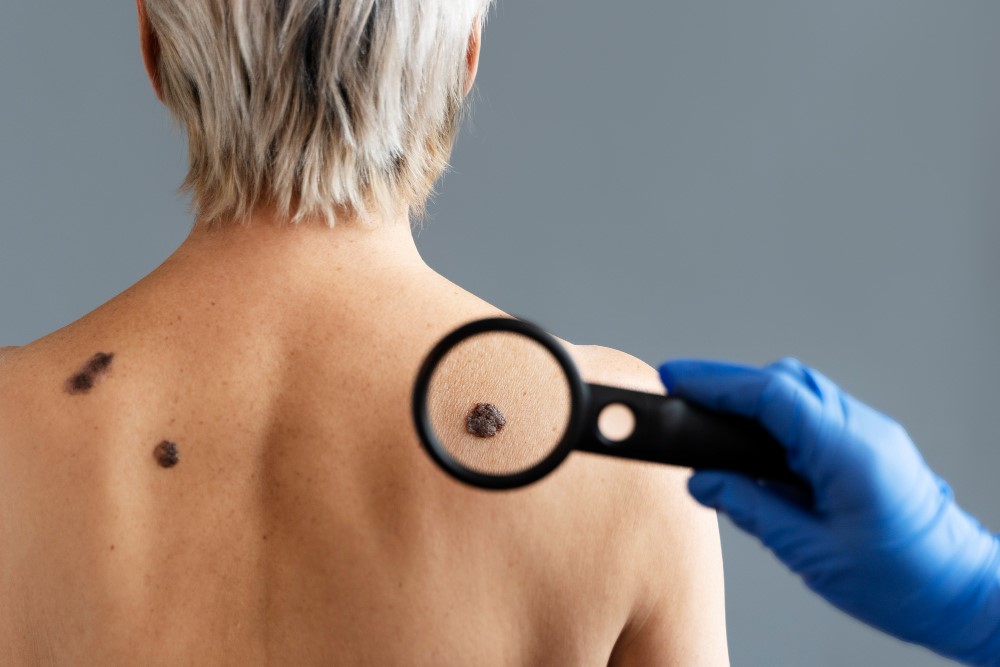Recognizing skin cancer symptoms early can be a lifesaver. It’s crucial for anyone exposed to the sun or environmental pollutants. In India, skin cancer might not be as common as in Western countries, but it’s still significant due to the varied climates and sun exposure levels. This guide aims to educate about the different types of skin cancer that can affect Indians, like basal cell carcinoma, squamous cell carcinoma, and melanoma. Understanding these distinctions can aid in early prevention and treatment. By routine monitoring and knowing what changes to look for, anyone can catch the early signs of skin cancer. This blog will help you grasp the essentials to protect yourself or loved ones effectively.
Uncovering Skin Cancer: Know the Basics
In India, the major types of skin cancer include basal cell carcinoma, squamous cell carcinoma, and melanoma. Each type has unique traits and requires specific attention.
- Basal Cell Carcinoma: Though not as aggressive, it’s the most common form. It appears as a small, shiny bump in sun-exposed areas.
- Squamous Cell Carcinoma: More aggressive than basal, it shows up as thick, scaly patches, which can evolve into open sores.
- Melanoma: The most severe, often taking the form of dark moles with irregular edges. It’s less common but spreads faster than others.
Genetic factors can lead to a higher risk in certain populations. In India, lighter skin tones may develop different cancer types than darker tones. Understanding differences between skin cancer types assists in tailored education and prevention strategies.
Environmental factors also play a crucial role. Sun exposure is the biggest risk factor, especially in regions with intense sunlight. Pollution can further damage skin, making it susceptible to cancers. Knowing these skin cancer causes allows for better prevention methods, like using sunscreen or covering skin when outdoors.
Recognizing Early Skin Cancer Symptoms: A Detailed Look
Detecting the early signs of skin cancer involves observation. Visible changes on the skin surface often indicate a problem. Watch for unusual growths, such as moles that alter in size, color, or shape.
- Unusual Moles: Regular moles are typically uniform in color and shape. Changes should prompt a dermatologist visit.
- Textural Changes: Skin becoming rough, scaly, or crusty could signal the onset of cancer.
- Persistent Itching or Pain: These signs, especially if combined with the above, should never be ignored.
Lifestyle factors could impact the symptoms’ severity. In India, outdoor activities are common, increasing sun exposure. Diet and daily habits also play roles. Those who consume high amounts of processed foods or smoke may see aggravation of symptoms.
Being attentive to how the skin feels is essential. Regular checks using a skin cancer symptom checklist can save lives. Monitor for these irregularities, especially following family history signs. Catching these issues early dramatically increases the likelihood of effective treatment and recovery.
Taking Action: Prevention, Detection, and Care in India
Taking proactive steps for skin cancer detection methods is key. Self-examination can catch early problems. Here’s a comprehensive checklist:
- Examine skin monthly using mirrors to view all areas, including places hard to reach or see.
- Note any new moles or changes in existing ones.
- Look for any non-healing sores or unusual patches of skin.
Regular visits to a dermatologist are vital. Even if no changes are observed, annual check-ups can detect signs unseen to the untrained eye. If skin cancer symptoms are spotted, many treatment options exist, ranging from topical treatments to surgery, depending on the cancer type and stage.
Lifestyle changes can significantly reduce risk. Incorporate the following into your routine for prevention:
- Wear sunscreen daily, regardless of weather.
- Adopt a healthy diet rich in antioxidants.
- Quit smoking, as it can exacerbate skin damage.
Recent scientific advances in India offer promising new ways for early detection. Devices such as dermatoscopes and non-invasive screening techniques are now available, making detection easier and less stressful.
Understanding and acting upon skin cancer symptoms is crucial. With these guidelines, not only can you learn to recognize them, but also adapt accordingly to maintain healthy skin for life. It’s about blending knowledge, observation, and action to ensure safety and wellness, particularly in environments like India, where the sun’s impact is profound.

